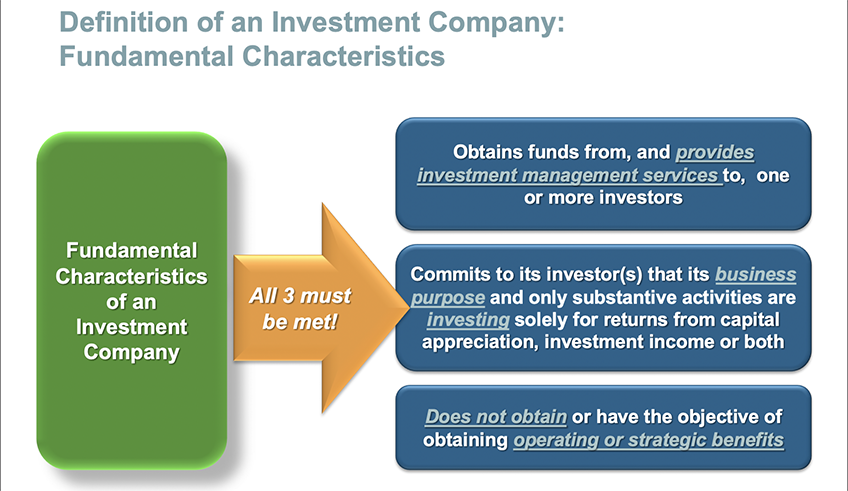Table of Contents
Financial investment business spend money on behalf of their customers that, in return, share in the earnings and losses.

Financial investment business do not consist of broker agent business, insurance business, or banks. In United States safety and securities policy, there are at the very least 5 kinds of investment firm: Generally, each of these investment firms must sign up under the Securities Act of 1933 and the Financial Investment Company Act of 1940. A fourth and lesser-known kind of investment firm under the Investment Company Act of 1940 is a Face-Amount Certificate Business.
A significant kind of business not covered under the Investment Firm Act 1940 is exclusive investment firm, which are simply private companies that make financial investments in stocks or bonds, but are restricted to under 250 financiers and are not managed by the SEC. These funds are usually made up of extremely well-off capitalists.
This offers certain defenses and oversight for capitalists. Controlled funds normally have constraints on the types and quantities of financial investments the fund manager can make. Generally, regulated funds may only purchase detailed protections and no greater than 5% of the fund might be spent in a single safety. Most of financial investment companies are shared funds, both in terms of number of funds and possessions under administration.
Investment Management in Sugar Land
The initial financial investment counts on were developed in Europe in the late 1700s by a Dutch trader that wished to enable tiny investors to pool their funds and branch out. This is where the concept of investment business stem, as specified by K. Geert Rouwenhorst. In the 1800s in England, "financial investment pooling" arised with trusts that resembled contemporary financial investment funds in structure.

Brand-new safeties laws in the 1930s like the 1933 Stocks Act recovered investor confidence.
U.S. Stocks and Exchange Payment (SEC).
Investment Company
Lemke, Lins and Smith, Regulation of Financial Investment Companies, 4.01 (Matthew Bender, 2016 ed.). ACM. 2023.
In retail financial investment funds, countless investors may be involved via intermediaries, and they may have little or no control of the fund's activities or expertise about the identities of various other capitalists. The possible variety of investors in a personal investment fund is generally smaller than retail funds. Personal mutual fund tend to target high-net-worth people, including politically subjected individuals, and fund managers might have a close partnership with their client capitalists.
:max_bytes(150000):strip_icc()/income-investment-company.asp-final-7dfd80d1b7244b87bfbd6c179475a48d.png)
Passive funds have actually been expanding in their market share, and in some jurisdictions they hold a significant part of possession in openly traded business. There are various categories for investment funds. For instance, some are closed-end, indicating they have a fixed number of shares or resources, whilst others are open-end, implying they can expand right into unlimited shares or resources.
The prices, danger, and regards to derivatives are based upon an underlying asset, and they enable investors to hedge a position, rise leverage, or speculate on a possession's change in worth. A financier might have both a stock and an alternative on the very same supply that allows them to market it at a set price; for that reason, if the supply's rate drops, the choice still keeps value, minimizing the capitalist's losses.
Whilst thought about, offered the focus of this rundown on the robot of corporate cars, a full therapy of the beneficial possession of properties is outside its range. A mutual fund acts as an avenue to gain from several assets being held as financial investments. Capitalists can be individuals, corporate cars, or institutions, and there are generally a variety of intermediaries between the investor and mutual fund along with in between the mutual fund and the underlying financial assets, especially if the fund's units are exchange-traded (Box 1).
Mineral Rights Companies local to Sugar Land, Texas
Depending on its lawful kind and framework, the people working out control of a mutual fund itself can vary from the individuals who have and take advantage of the underlying properties being held by the fund at any provided factor in time, either directly or indirectly. Both retail and personal investment funds commonly have fund managers or advisors who make financial investment decisions for the fund, selecting protections that straighten with the fund's goals and run the risk of tolerance.
and serve as intermediaries between financiers and the fund, helping with the trading of fund shares. They connect capitalists with the fund's shares and implement professions on their behalf. take care of the registration and transfer of fund shares, keeping a document of shareholders, processing ownership modifications, and releasing proxy materials for investor conferences.
Navigation
Latest Posts
Landscape Design Contractor
Landscape Design Services
Investment Company local to Sugar Land